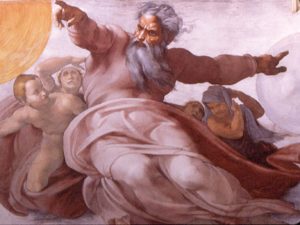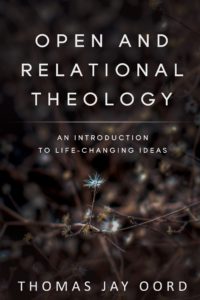God’s Knowing Isn’t Causal
Open and relational theology says God doesn’t foreknow everything that will happen in the future. If God did foreknow all with certainty, the future would be settled. A completely settled future is incompatible with our making free choices.
Some hear this and think open and relational thinkers are saying God’s foreknowing would cause the future to be settled. But this isn’t what most open and relational thinkers believe.
Open and relational thinkers believe God knows what might happen. But God can’t be certain about what free creatures will decide or what random events will occur until those decisions have been made or events happen.
God doesn’t have “definite exhaustive foreknowledge,” to use a phrase common among scholars.
The Argument in Plain Language
The argument against God foreknowing goes like this…
If God foreknows all that will occur and God can’t make mistakes, nothing could happen other than what God foreknows. But to be free, creatures must choose among live options. They must have real say-so or make genuine choices among possibilities.
So, if God knows the future, creatures can’t be free.
Let me put it another way. If God foreknows all with certainty, what we think is an open future must actually be closed. Instead of a realm of live options, the future must be complete, decided, and settled. Instead of being able to make free decisions about life and love, we’re merely experiencing a simulation, like the Matrix.
If God foreknows all events that will occur, freedom, love, and randomness are myths.
A Chocolate Ice Cream Example
Suppose we’re at a self-serve ice cream parlor on a warm summer day. We see Andee pick up her peppermint-striped bowl and walk toward the ice cream. She’s about to select one of three flavors: chocolate, vanilla, or strawberry.
Suppose Andee’s not sure which to choose. They’re all delicious. Decisions, decisions, decisions! Her mouth waters.
Now suppose in some mysterious way it’s already been settled, Andee gets chocolate. It’s not a matter of whether she may get vanilla or strawberry. Andee must get chocolate. She’s not free to choose otherwise, because it’s been determined.
Notice the difference between may and must in this example. May assumes more than one live option; Andee may get any flavor. Must requires Andee to act one way. If she must get chocolate, she’s not free to do otherwise.
Who Settled the Future?
The question arises: “Who or what decided that Andee’s getting chocolate?”
People who think God predestines life will answer, “God settled it.” Those who think existence is entirely determined by atoms, genes, or neurons say, “Nature settled it.” Those who think we’re determined by culture or upbringing point to environments and circumstances as determiners. People who think we’re robots might blame our computer programs or programmer. One might even say, “It’s blind fate.”
Here’s the key idea: saying God foreknows Andee gets chocolate doesn’t cause Andee to get chocolate. Knowing doesn’t force anyone. Instead, God can only be certain about some future event if that future has already been settled, fixed, or complete.
God’s knowledge of past and present events and of future possibilities doesn’t cause them to occur.
It doesn’t matter how it was settled. Maybe it was the atoms, Andee’s upbringing, evolution, or fate. Or some combination of these. What matters is something or someone settled the matter before Andee walked to the ice cream. She’s getting chocolate.
The point: God can only be certain about a future event if it has already been determined. But future events are not determined, because they have not yet occurred. (For a brief explanation on why Molinism fails to help, see footnote[i].)
Free to Choose Chocolate or Something Else
Open and relational theists reject the idea God knows with certainty Andee chooses chocolate. God could only foreknow Andee gets chocolate if her doing so had somehow already been determined. Open and relational thinkers believe Andee is free.
A settled future has no live options from which Andee can choose.
(Most of the previous text is an excerpt from Open and Relational Theology. Click for more on the book.)
[i] One alternative to open and relational theology goes by the name “middle knowledge” or “Molinism.” It says God chose to create this world among the possible worlds God could have created. When choosing, God looked at how all worlds would play out. God can look into the future, says Molinism, and foresee every future decision.
Debates on the details of middle knowledge are technical, such as the status of counterfactuals and the grounding problem. But we don’t need the details to see a problem with middle knowledge. Our story about Andee and ice cream illustrates it.
The middle knowledge view says God can foreknow with certainty that Andee gets chocolate. If a mistake-free God foreknows Andee gets chocolate, Andee must get chocolate. God can’t make a mistake, so Andee’s not free to do otherwise. From the perspective of open and relational theologians (and others), Molinism is incoherent. There’s never a time (even before God created our world) the outcomes of free decisions can be known in advance.



Comments
This seems to exclude the idea that God can somehow exist beyond the limitations of time. During the time of John Wesley, the industrial revolution was not a settled future. Now it is. There is a future time where many things yet undetermined will be. If God can see ahead, I don’t think it in any way limits our freedom to act now. Opportunity always gives way to history.
Thanks, Tim. Yes, this view denies that God is timeless, in the sense of being outside time. It says God experiences time moment by moment, like we do. If God could know the future with certainty, and if God doesn’t make mistakes, the future would have to be complete, settled, and fixed. But that’s incompatible with choosing among live options. You might check out my new book OPEN AND RELATIONAL THEOLOGY for more info.
I believe that God foreknows the future perfectly and exhaustively. However, I do question the assumption that the future is in some sense already settled. I believe that the future that God perfectly foreknows includes contingent events – it could go this way or that – dependent upon uncoerced choices made by free moral agents. Furthermore, I believe that God knows each of the alternatives fully and perfectly and is able to plan accordingly. Being infinite in wisdom and knowledge He is able to hold in His consciousness not only what will happen but also what may happen. For me the debate is not about the extent of God’s foreknowledge – but rather the nature of the future that God perfectly foreknows.
As regards the question as to whether God exists in time – I can’t help but feel that the question is being asked from the wrong angle – I think the questions should be- Is there anything in God’s experience of Godself to which our experience of time is analogous? When looked at that way – the answer is clearly – yes.
As Andee’s parent, I might predict 9 times out of 10 that she get’s chocolate, because I know her as a parent. But I could still be wrong. God knows me better than I know myself, so He is a better predictor of my behavior than anyone else, but He has no guarantee that I will not surprise Him with my free choice. I would say, when it comes to knowing the future of anything in all creation, God is a better “predictor of the weather” than we are.
I like that, Steve!
Good insights, Eric. If God knows, as you put it, that a contingent event could go this way or that, it seems that God doesn’t know for sure which of those ways things will go. That way of thinking is compatible with open theism. Open and relational thinkers often say God knows all the possibilities but is not certain which of the possibilities will become actual.
God’s foreknowledge does not cause an individuals free choice yet if God knows the future then the agents choice was not free. Is that what you are saying? If God knows the future then he knows all possibilities were ruled out except for the actual free choice.
I think if I knew Andee as God knows her I would know that she freely would choose chocolate however her free will and responsibility for that choice would still be truly free
A glass of milk and a pint of beer are placed in front of me God knows I am thirsty and like beer, God also knows I am lactose intolerant.. what are the chances I drink the milk?
Not too good 😂
Thanks for your good response. You get my central argument. And I like the idea that because God knows us well, God can predict what we will do with a high degree of accuracy.
But predict and know with certainty are different. And many choices in life are not between beer and milk; we face a wide array of options in each moment. So I agree that God’s complete knowledge of the present provides God with a higher degree of anticipatory accuracy, but that’s not the same as certainty.
At least that’s how I see it!
Tom
Lets say I know Tom.. consciousness, un consciousness .. his past and every concomitant factor that informs his descision at every moment.. I believe i can predict your next move with absolute certainty ( without diminishing your free choice)
My question to you is this.. does God know enough about us at any given moment to make a perfect perdiction or are there things about us that God cannot know as to make a perfect perdiction? ( I dont have the answer)
What does God know about us at any given momement to negate a perfect perdiction
[…] https://thomasjayoord.com/index.php/blog/archives/gods-knowing-isnt-causal […]